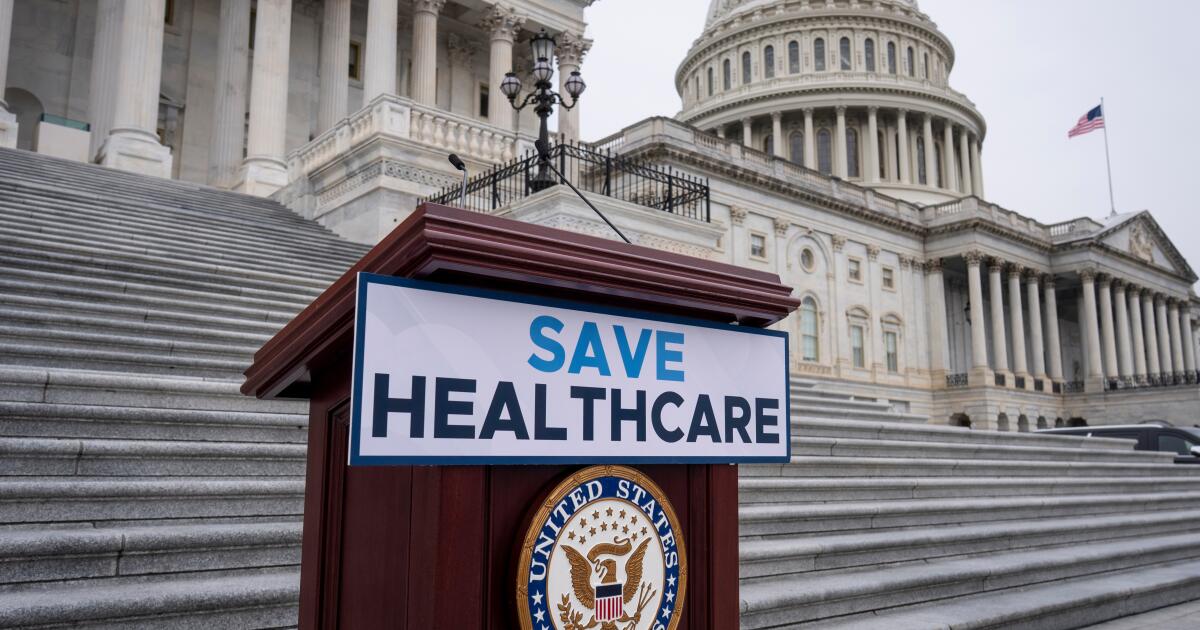Health care compromise appears far off as the government shutdown stalemate persists
WASHINGTON — The government shutdown has reopened debate on what has been a central issue for both major political parties in the last 15 years: the future of health coverage under the Affordable Care Act.
Tax credits for people who get health insurance through the marketplaces created by the Affordable Care Act, also known as Obamacare, expire at the end of the year.
Democrats say they won’t vote to reopen the government until Republicans negotiate an extension of the expanded subsidies. Republicans say they won’t negotiate until Democrats vote to reopen the government. Lawmakers in both parties have been working on potential solutions behind the scenes, hoping that leaders will eventually start to talk, but it’s unclear if the two sides could find compromise.
As Congress circles the issue, a poll from The Associated Press-NORC Center for Public Affairs Research found that about 6 in 10 Americans are “extremely” or “very” concerned about their health costs going up in the next year. Those worries extend across age groups and include people with and without health insurance, the poll found.
A look at the subsidies that are expiring, the politics of the ACA and what Congress might do:
Enhanced premium help during the pandemic
Passed in 2010, the ACA was meant to decrease the number of uninsured people in the country and make coverage more affordable for those who don’t have private insurance. The law created state by state exchanges, some of which are run by the individual states, to try to increase the pool of the insured and bring down rates.
In 2021, when Democrats controlled Congress and the White House during the COVID-19 pandemic, they expanded premium help that was already in the law. The changes included eliminating premiums for some lower-income enrollees, ensuring that higher earners paid no more than 8.5% of their income and expanding eligibility for middle-class earners.
The expanded subsidies pushed enrollment to new levels and drove the rate of uninsured people to a historic low. This year, a record 24 million people have signed up for insurance coverage through the ACA, in large part because billions of dollars in subsidies have made the plans more affordable for many people.
If the tax credits expire, annual out-of-pocket premiums are estimated to increase by 114% — an average of $1,016 — next year, according to an analysis from KFF.
Democrats push to extend subsidies
Democrats extended those tax credits in 2022 for another three years but were not able to make them permanent. The credits are set to expire Jan. 1, with Republicans now in full control.
Lacking in power and sensing a political opportunity, Democrats used some of their only leverage and forced a government shutdown over the issue when federal funding ran out on Oct. 1. They say they won’t vote for a House-passed bill to reopen the government until Republicans give them some certainty that the subsidies will be extended.
Democrats introduced legislation in September to permanently extend the premium tax credits, but they have suggested that they are open to a shorter period.
“We need a serious negotiation,” Senate Democratic leader Chuck Schumer has repeatedly said.
Republicans try to scale the ACA back, again
The Democratic demands on health care have reignited longstanding Republican complaints about the ACA, which they have campaigned against for years and tried and failed to repeal in 2017. Many in the party say that if Congress is going to act, they want to scrap the expanded subsidies and overhaul the entire law.
The problem is not the expiring subsidies but “the cost of health care,” Republican Sen. Rick Scott of Florida said Tuesday.
In a virtual briefing Tuesday, the libertarian Cato Institute and the conservative Paragon Health Institute branded the subsidies as President Joe Biden’s “COVID credits” and claimed they’ve enabled fraudsters to sign people up for fully subsidized plans without their knowledge.
Others have pitched more modest proposals that could potentially win over some Democrats. Senate Majority Leader John Thune, R-S.D., has said he is open to extending the subsidies with changes, including lower income limits and a stop to auto-enrollment that may sign up people who don’t need the coverage.
The ACA is “in desperate need of reform,” Thune has said.
House Republicans are considering their own ideas for reforming the ACA, including proposals for phasing out the subsidies for new enrollees. And they have begun to discuss whether to combine health care reforms with a new government funding bill and send it to the Senate for consideration once they return to Washington.
“We will probably negotiate some off-ramp” to ease the transition back to pre-COVID-19 levels, said Maryland Rep. Andy Harris, the head of the conservative House Freedom Caucus, during a virtual town hall Tuesday.
Is compromise possible?
A number of Republicans want to extend the subsidies. Sen. Josh Hawley, R-Mo., said most people who are using the exchanges created by the ACA “don’t really have another option, and it’s already really, really expensive. So I think there are things we can do to reform the program.”
Hawley said he had been having conversations with other senators about what those changes could be, including proposals for income limits, which he said he sees as a “very reasonable.”
Bipartisan groups of lawmakers have been discussing the income limits and other ideas, including making the lowest-income people pay very low premiums instead of nothing. Some Republicans have advocated for that change to ensure that all enrollees are aware they have coverage and need it. Other proposals would extend the subsidies for a year or two or slowly phase them out.
It’s unclear if any of those ideas could gain traction on both sides — or any interest from the White House, where President Donald Trump has remained mostly disengaged. Despite the public stalemate, though, lawmakers are feeling increased urgency to find a solution as the Nov. 1 open enrollment date approaches.
Democratic Sen. Jeanne Shaheen of New Hampshire has been talking to lawmakers since the shutdown began, trying to find areas of compromise. On Tuesday, she suggested that Congress could also look at extending the enrollment dates for the ACA since Congress is stalled on the subsidies.
“These costs are going to affect all of us, and it’s going to affect our health care system,” she said.
Jalonick writes for the Associated Press. AP writers Lisa Mascaro and Joey Cappelletti in Washington and Ali Swenson in New York contributed to this report.

